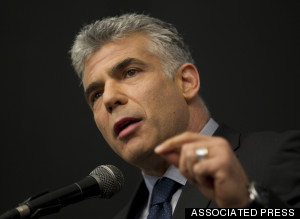
Israel’s outspoken Prime Minister Benjamin Netanyahu on Tuesday fired his finance minister, Yair Lapid, and justice minister, Tzipi Livni, and called for the dissolution of the parliament and early elections. The move came after a week of intense political bickering over a "Jewish nationhood" bill and a proposal for housing tax cuts, which laid bare the deep resentment between the different factions in Netanyahu's coalition. This week, he seemed to have had enough.
The new elections are set to take place in March 2015. While Netanyahu's bold move drew approval from some and criticism from others, most analysts agree that the election will be about politics, not policy.
“There is no ideology involved,” Gadi Wolfsfeld, a professor of political communications at the Interdisciplinary Center in Herzliya, told The New York Times. “For now it is pure politics."
“These elections will be the strangest, most superfluous elections ever held here. They will be held solely because of the mutual loathing that government and party leaders have for one another,” Yossi Verter wrote in the Israeli newspaper Haaretz on Tuesday.

Netanyahu hinted at that "mutual loathing" at a press conference on Tuesday, which followed a week of sparring over a bill that would officially designate Israel as the home of the Jewish people and a proposal, championed by Lapid, that would reduce housing taxes. At the conference, Netanyahu slammed Lapid and Livni over their repeated criticism of his policies, saying he was tired of the infighting among the coalition partners.
"Unlike its predecessor, the current government, from the day of its inception, was a contrarian government," the prime minister said. "I won't tolerate any more opposition within the government, I won't tolerate ministers attacking from within the government the government's policies and its leader," he added.
Netanyahu's fractious coalition came into place after the elections of January 2012. While Netanyahu succeeded in winning a third term as prime minister, he wasn't able to form the coalition of his choice. The New York Times explains that an alliance of two relatively new political figures performed unexpectedly well in those elections: Lapid, a former television talk show host turned political star who leads the Yesh Atid party, and Naftali Bennett, the minister of economy and head of the pro-settlement Habayit Hayehudi party.
In order to reach a majority, Netanyahu was forced to form a coalition with Lapid and Bennett, rather than with a number of religious parties to which he has always been closer. As The Times notes:
Mr. Netanyahu could not form a government without one or the other. They banded together and conditioned their participation on the exclusion of the ultra-Orthodox parties, Mr. Netanyahu’s longstanding allies.
Netanyahu's government ended up consisting of five parties: his own Likud party, Habayit Hayehudi, Yesh Atid, Livni's small centrist Hatnua party and Yisrael Beyteynu, led by foreign minister Avigdor Lieberman.
Now, however, Netanyahu may be hoping to drop Lapid and Livni’s backing in favor of support from the religious parties he was previously forced to exclude.

Will Netanyahu's bet pay off? Polls published on Wednesday indicate that Netanyahu's party is predicted to become the largest, but will remain short of a majority.
As Middle East analyst Aaron David Miller states in Foreign Policy, "this election is Bibi's to lose." While Netanyahu's polling numbers are bad, his competitors' are worse, Miller notes, adding that the prime minister has the best chances of being able to put together a coalition. And while Netanyahu has been quick to point out the many major challenges Israel faces -- the conflict with the Palestinians, a potentially nuclear Iran, a struggling middle class -- it is unlikely that these issues will take over the discourse of the upcoming campaign.
“This won’t be an election fought on issues but a relentlessly negative campaign in which each party will try to smear its rivals as irresponsible fanatics,” Anshell Pfeffer writes in Haaretz.
While opinion polls suggest Israeli voters have not significantly changed their positions since the previous election a mere 22 months ago, Pfeffer notes, there are a number of new factors that could affect this spring's outcome. He points to the recent wave of attacks on Israeli targets by Palestinians, including the deadly assault on a Jerusalem synagogue last month, suggesting that voters may be influenced by security concerns. Pfeffer also echoes Miller's observation that none of Netanyahu's opponents pose a devastating threat. Finally, the electoral threshold that parties have to reach to gain seats in the parliament was recently raised, which also plays in the prime minister's favor.
But BBC's Kevin Connolly cautions that in Israeli politics, surprise is never far off. For instance, five years ago, the centrist Kadima party was a powerhouse, but only has two seats left in the current parliament. And a new party, Yesh Atid, rose meteorically to prominence in the last election. This time around, Connolly has his eyes on former minister Moshe Kahlon and the new party he promised to found, as well as on the Arab parties, who have said they may run on a single list.
Still, Israelis do not appear terribly excited about the prospect of new elections. One poll even suggested that many are not convinced that it was really necessary to dissolve parliament, Connolly notes.
Others have lamented the implications for Israel's economy, which is still recovering from two months of war with Hamas. Bloomberg suggested on Tuesday that the elections could have negative consequences for the already slowing economy, since the vote will delay the approval of the budget and the implementation of reforms.
But according to David Horovitz at the Times of Israel, unfortunately for the Israeli public, the political games are not likely to come to an end any time soon. As long as Israel remains the “land of multiple medium-sized parties,” Horovitz argues, “these newly imposed elections are likely to signal not the end of the political jockeying for a while, but just a fresh starting point in our politicians’ remorseless, short-sighted bargaining and extortion games.”
